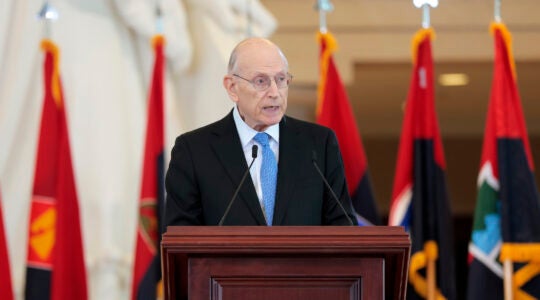
Children raise the Israeli and Haitian flags as the national anthems of both countries are played during a ceremony at a refugee camp on the edge of Port-au-Prince, March 2010. (Larry Luxner)
PORT-AU-PRINCE, Haiti (JTA) — Amir Kashi, a 34-year-old social worker from Ma’ale Adumim, and Yehonatan Abraham, a 30-year-old medic from Beersheva, knew nothing about Haiti before the earthquake in January.
But both Israelis felt compelled to act after the disaster struck.
“I felt impotent in Israel, sitting in front of my big-screen TV,” Abraham said. “I said to myself, I have to help them.”
He and Kashi joined Natan — Israeli Coalition for International Humantarian Aid, a Tel Aviv-based relief organization founded by the late Israeli peace activist Abie Nathan.
Abraham now spends his mornings vaccinating quake survivors in Haiti against infectious diseases at a clinic in the sprawling tent city of St. Marie. In the afternoons, he helps the World Food Program hand out meals to 1,000 children a day.
“My mom didn’t want me to come here because of all the diseases,” Abraham said, “but I’ve done some amazing things in Haiti. Last week I saved a person’s life, a 29-year-old man with severe pneumonia.”
Natan is one of several Israeli groups working in post-earthquake Haiti. Its volunteers come for three-week stints, living as a group at the Park Hotel in Port-au-Prince but fanning out all over the devastated city on specific medical and educational missions. Natan already has sent five groups to Haiti since the quake; 11 more are planned over the next year.
Daniel Kedar, an Israeli businessman who’s lived in Haiti for many years, helped Amos Radian, Israel’s ambassador to the neighboring Dominican Republic, coordinate Israel’s rapid initial response to the January earthquake.
Within 48 hours of the quake, two El Al cargo jets, a Boeing 777 and a Boeing 747, touched down at Port-au-Prince’s international airport. They were filled with 250 doctors and nurses, food, water, tents, medical equipment and essential supplies.
“The IDF landed on Thursday, and by Friday they were already the first fully functioning field hospital in Haiti,” Kedar said. “They did over 1,000 operations, from amputations to delivering babies.”
Admiration for Israel ran so high here that many Haitian parents whose children were born right after the quake gave them Israeli names, Kedar said.
The field hospital closed down after two weeks, but Natan has remained in Haiti, along with another NGO called IsraAid. Natan already has opened several schools in the city’s squalid refugee camps, using military tents left behind from the IDF field hospital.
At one of those camps, Route de Batimat, not far from the airport, 500 homeless adults and children gathered on a recent Friday morning to thank Israel for building a tent school. In a ceremony that lasted more than two hours, kids in blue and yellow T-shirts emblazoned with the Haitian and Israeli flags made speeches in French and Creole, read poetry and sang both countries’ national anthems. The Haitian marching band played “Hatikvah.”
Kedar says the hardest part of Haiti’s reconstruction is only now beginning. The foundation Kedar runs, ProDev, is partnering with the American Jewish Joint Distribution Committee to provide clean drinking water and operate temporary schools for displaced children, including the one at Route de Batimat.
“We don’t have the ambition to replace the national education system, but there’s a big gap between what is announced on the radio and TV and what’s actually happening on the ground,” Kedar said. “I spend a lot of time in the camps, and the reality is that kids psychologically will not go back to concrete buildings, even if they’re intact. I just don’t see it happening.”
Israeli entities suddenly interested in Haiti aren’t limited to NGOs.
Some companies see opportunities in post-quake Haiti. One is DK Textiles Company, which is said to be negotiating with the government of President René Préval to build an enormous $200 million garment factory in the northern city of Cap-Haitien that would employ 8,000 people, mostly women.
In Haiti, factory workers earn about $3 a day, making them the lowest-paid anywhere in the Western Hemisphere. The planned factory in Cap-Haitien would replace DK’s former operations at the Al-Hassan Industrial Estate in Irbid, Jordan.
JTA has documented Jewish history in real-time for over a century. Keep our journalism strong by joining us in supporting independent, award-winning reporting.





